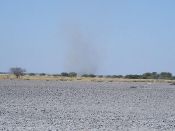| ROSELT |
Long Term Ecological Monitoring Observatories Network |
| Time span: |
long term |
| Aim: |
The fundamental purpose of ROSELT is to improve knowledge of the mechanisms, causes, consequences and scope of desertification in arid and semi-arid zones of the circum-Saharan area. Its objectives concern long-term environmental monitoring and research into the interactions between populations and their environment at local level. |
| Description: |
In spite of the quantity and quality of research work on land degradation in arid and sem-iarid zones, very little research has been conducted into the dynamic links between the biophysical conditions of land degradation (including desertification) and population lifestyles. Faced with the problem of desertification, societies have for many years developed mechanisms to protect themselves against its detrimental effects the best as they can. There is a long tradition of migration of populations during the dry season, mobility of herds (the importance of transhumance), and the exploitation of extensive and highly dispersed crops to reduce economic and climatic risks, etc. This adaptive response of societies clearly denotes the existence of strong links between societies and their environment; links that are important to understand before undertaking development action or renewable resource management initiatives. Furthermore, the scientific community and research beneficiaries are faced with a serious lack of environmental data over a sufficiently extensive period of time to determine trends through reliable indicators. |
| Countries: |
30 circum-Saharan observatories, of which 12 are pilot observatories in 11 countries (Morocco, Algeria, Tunisia, Egypt, Mauritania, Mali, Niger, Senegal, Cape Verde, Ethiopia and Kenya). |
| Website: |
http://www.roselt-oss.org/accueil.php?type=graph&langue=1%20 (link expired) |
|



